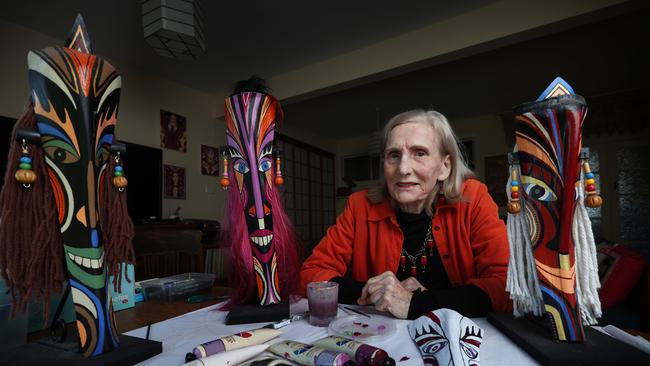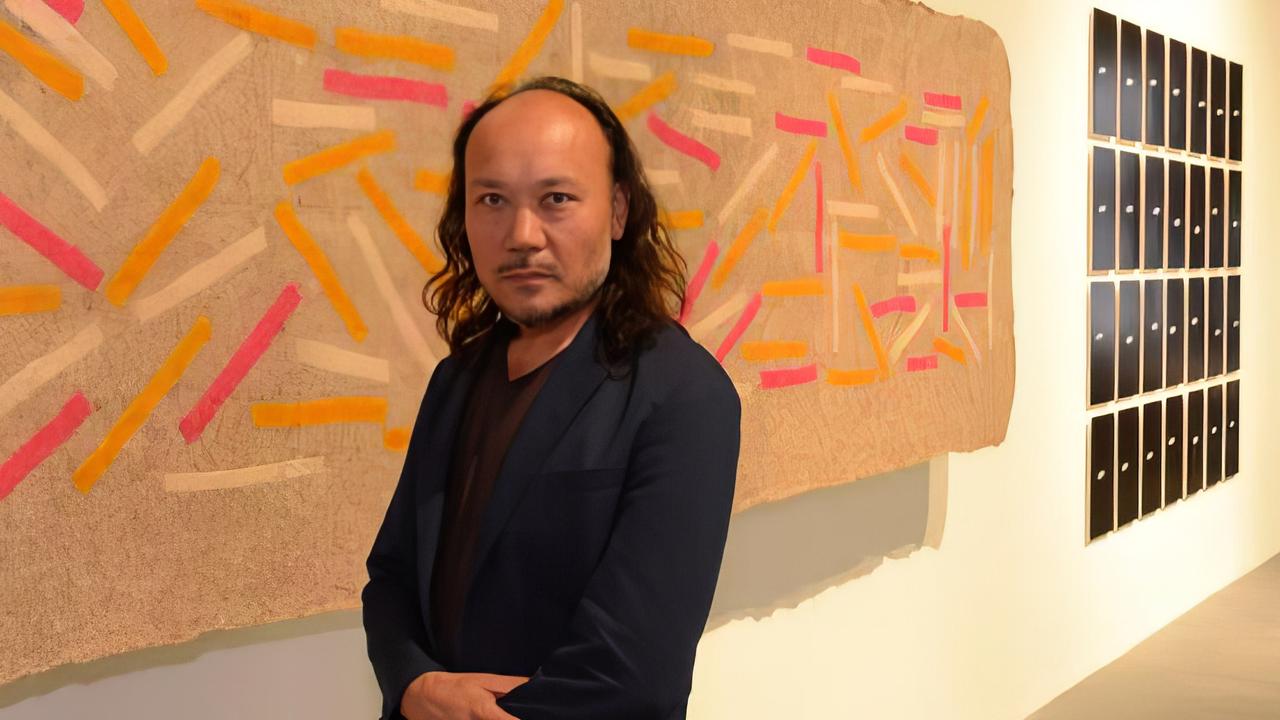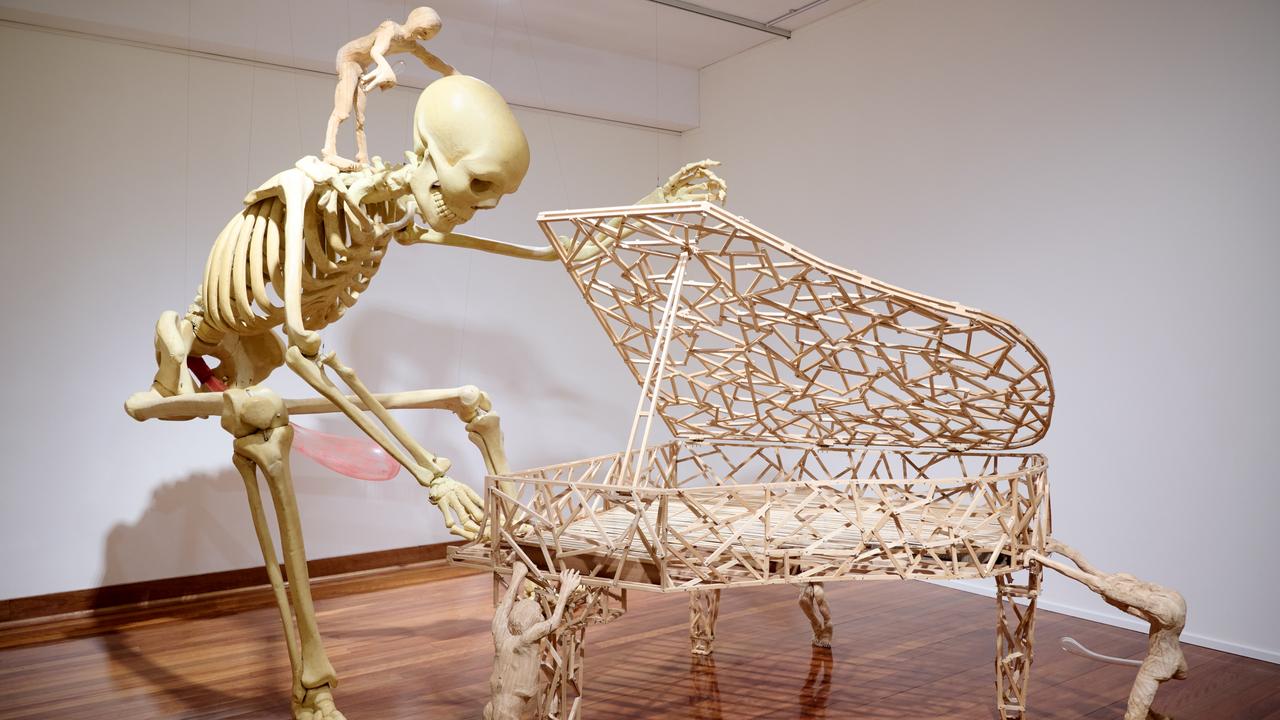Artist Liz Parkinson unmasks Gosford Regional Gallery’s cultural confusion
The quirky, vibrant masks artist Liz Parkinson creates are lauded and loved worldwide but in regional NSW it’s a different story.

The quirky, vibrant masks artist Liz Parkinson creates are lauded and loved worldwide but in regional NSW it’s a different story.
Barred from exhibiting the masks at the Gosford Regional Gallery on the grounds of cultural appropriation in 2022, a bemused Parkinson, 78, says she is “pissed off’’, especially after exhibiting there twice previously without objection.
The Central Coast Council-run gallery had displayed the masks, composed of palm fronds, beads, jewellery and recyclable materials. It still sells Parkinson’s books and paintings.
And just this month her masks were shown at Tuggerah’s Red Tree Theatre and Gallery to an appreciative crowd while attracting another exhibition invitation.
“There were absolutely no complaints and I found the masks really interesting, fun and creative,’’ co-ordinator Sue Candy said. “I didn’t link them to any indigenous or tribal group. People were thrilled.’’
But Gosford Regional Gallery director Tim Braham deemed them culturally appropriated.
“It is no longer acceptable for artists to exhibit works … derived from cultures which have been culturally dispossessed,’’ he wrote to the North Avoca artist in 2022.
“We believe that it does not sit within the values of the Gosford Regional Galleries to allow this work to be displayed in our spaces.’’
Mr Braham this week declined to comment.
In 15 years of mask-making, Parkinson has exhibited in Canada, Thailand, the UK and the Netherlands and, such is her artistic appeal, Canada has invited her back to exhibit at an international mask festival next year.
“The Gosford Gallery thinks I’m copying artworks from tribal and indigenous cultures but it’s all from my imagination. It’s absolutely ridiculous,’’ she said, describing the masks as happy, colourful faces. “Tribal masks are ceremonial and solemn, mine are decorative and smiley. I think the word ‘mask’ may be the problem.
“All art is derivative – nobody does anything that’s 100 per cent original and masks have been made in all … shapes and sizes.’’
In a flurry of emails over the masks, Parkinson complained that it seemed reverse racialism was operating at the gallery.
“Could you please tell me which traditional cultures you believe my work is based on?’’ she asked a gallery officer.
“It’s obvious to us there are tribal connotations,’’ the officer replied. “We have a responsibility to prevent any misrepresentation of First Nations cultures. We have to be vigilant on this kind of thing.’’
The case for vigilance might well be argued for the artist. Says Parkinson: “One shouldn’t have to self-censor their work. Ironically, First Nations and tribal people can adopt Western modes of self-expression with no criticism.’’
During the email back-and-forth, Glenn Cannard, the council’s unit manager of community and culture maintained the council it was in the process of reviewing “this vexed issue’’ of cultural appropriation with the arts community.
“The way it was undertaken could have been better,’’ he said.
Mr Cannard told The Australian the review was ongoing in several areas, specifically the arts.
In retrospect, he admitted, the issue was “a bit of overreach from curatorial staff (including gallery director Mr Braham) with this general reality of culture appropriation. I think it’s probably a hardline artistic view. Everyone wants to do the right thing but the guidelines are open to local interpretation.
“We are looking at a better methodology to deal with this. There will be no issue of her (Parkinson) utilising the gallery in the future with those exhibits and she’s aware of that.’’
However, Parkinson said she had heard nothing.



To join the conversation, please log in. Don't have an account? Register
Join the conversation, you are commenting as Logout